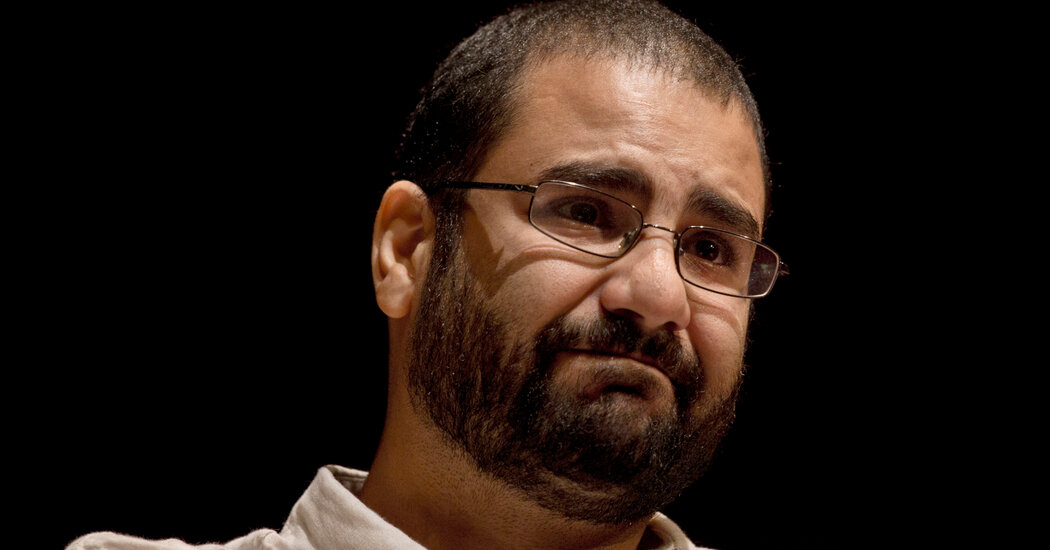
CAIRO — An Egyptian court sentenced three prominent human rights figures to several years in prison on Monday on charges of spreading false news, in a high-profile case that suggests that the government has not scaled back its crackdown on dissent.
The State Security Emergency Misdemeanor court sentenced the activist Alaa Abd El Fattah to five years in prison and the rights lawyer Mohamed el-Baqer and the blogger Mohamed Ibrahim, better known as Mohamed Oxygen, to four years each, Mr. Abd El Fattah’s mother, Leila Soueif, confirmed from the courtroom on Monday.
Local and international rights groups have described the charges as politically motivated. The verdicts cannot be appealed. The government of President Abdel-Fattah al-Sisi, who took power in 2014, has tried recently to improve its image on human rights, recognizing that international criticism of its record hurts its diplomatic standing and economic interests. It announced a strategy to advance human rights over the next five years, but critics say there has been little sign of meaningful change — only posturing to distract attention from ongoing repression.
The government lifted a four-year state of emergency, but granted the president and the security services powers that still give them free rein to quash protests and control the media. The authorities released several prominent activists from prison, but thousands remain jailed and the courts continue to roll out verdicts against others.
“The so-called reforms, like the human rights strategy, are merely for international consumption,” said Hussein Baoumi, Amnesty International’s Egypt and Libya researcher.
Egyptian authorities consistently dispute accusations of rights abuses, which officials and pro-government media often portray as part of a plot to bring down the state. They argue that exceptional measures were needed to restore stability after the turmoil that shook the state following the 2011 uprising that toppled President Hosni Mubarak, an autocrat who ruled for 30 years.
Mr. Sisi is eager to revive both Egypt’s economy and its international standing. It is hosting next year’s United Nations Climate Change Conference, the COP27, and plans, also next year, to inaugurate a $60 billion administrative capital city outside Cairo that it hopes will attract foreign investment.
After taking power, Mr. Sisi, a former army general and defense minister, oversaw a brutal crackdown on civil rights, quashing political opposition and public dissent, and using force to suppress protests. Human rights groups say that the crackdown has resulted in hundreds of deaths, and that tens of thousands of people have been jailed.
In May, more than 30 countries, including the United States and its closest allies, issued a highly critical statement calling on Egypt to allow activists, the media and others to speak out “without fear of intimidation, harassment, arrest, detention or any other form of reprisal.”
The United States recently said it would withhold $130 million in military aid to Egypt until the human rights situation there improves.
Amr Magdi, Egypt researcher at Human Rights Watch, described Mr. Sisi’s government’s recent measures as “the whitewashing efforts that Western governments, particularly the Biden administration, needed to continue business as usual.”
In the case of the three activists sentenced on Monday, Ms. Soueif described a very brief court session where the judge was absent and the defendants were kept in a basement cell beneath the courtroom. “A court administrator came out and laid out the verdicts like this: ‘Alaa five years, Baqer four, Oxygen four,’” she said in an interview.
They were among thousands arrested in connection with a rare wave of antigovernment protests in 2019, triggered by allegations of corruption by a former collaborator with the military.
Mr. Abd El Fattah, a software engineer who emerged as one of the best-known faces of the 2011 uprising, has spent much of the last 10 years in prison.
He was arrested in September 2019 at a police station, where he had been spending his nights as part of his conditional release after serving a five-year sentence for illegal protest, according to his lawyers and his family.
Mr. el-Baqer was arrested on the same day, when he tried to observe the investigation into Mr. Abd El Fattah. Mr. Ibrahim has spent much of the past four years in pretrial detention on different cases. Earlier this year, his lawyers said he attempted suicide after months of being deprived of visits in prison.
Mr. Abd El Fattah’s younger sister, Sanaa, also an activist, is currently serving an 18-month sentence on charges of spreading false news and insulting a police officer.
Rights groups say Egypt’s use of emergency courts, whose verdicts cannot be appealed, and pretrial detention undermines the country’s claims of upholding human rights.
A statement by 10 human rights groups on Monday denounced “the continued use of these exceptional courts in settling scores with human rights activists.”
Hossam Bahgat, the head of the Egyptian Initiative for Personal Rights, one the country’s largest rights groups, said, “Even by the standards of today’s Egypt this trial was a travesty of justice.” Mr. Bahgat himself was recently convicted of spreading false news and ordered by a court to pay a penalty.




